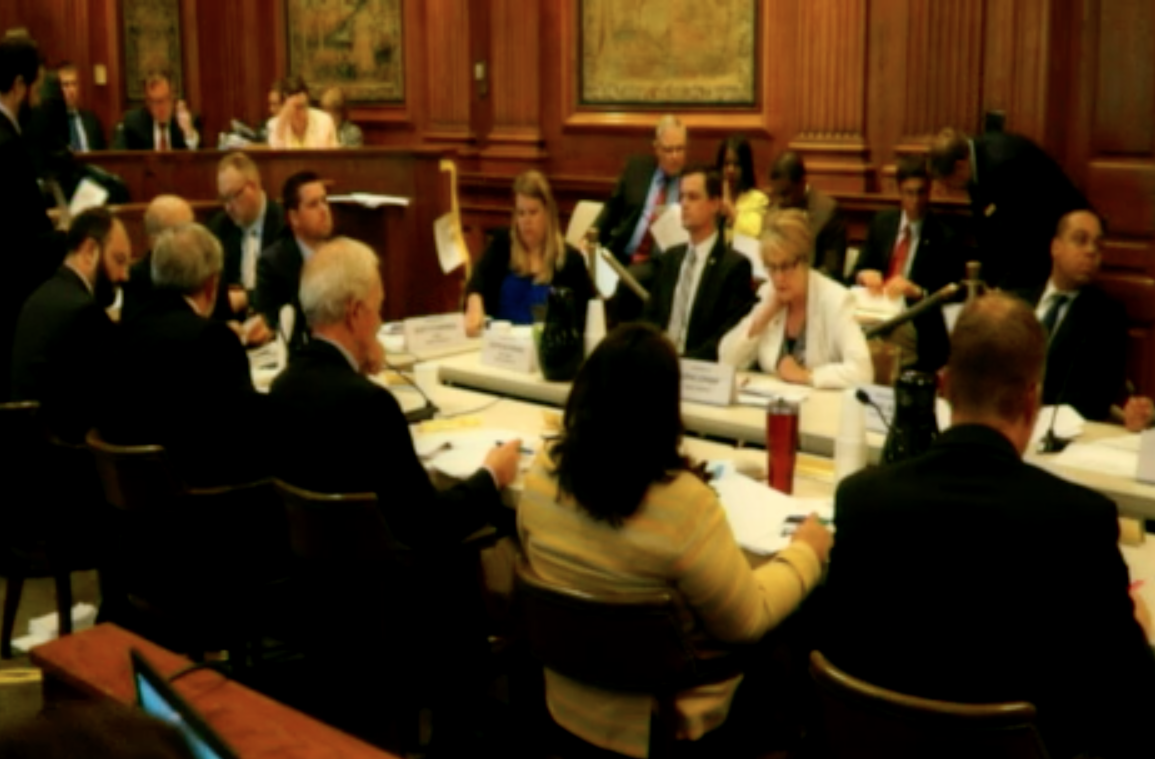JEFFERSON CITY, Mo. – With a Friday deadline looming overhead, the Missouri legislature is wrapping up its work on the state’s $27.8 billion budget.
Members of the House and Senate met Monday to settle their differences in conference, led by the budget leaders of each chamber. And despite a legislative session marred by the scandal surrounding the embattled Republican Governor Eric Greitens, the work on the budget this year has been less stressful for many involved in the process. The growing pains experienced last year seem to be a thing of the past, as the two chambers’ positions were almost completely worked out before entering the Senate Lounge for a conference.
Only a relatively small number of items remained to be worked out, but it seemed that the most contentious items had already been resolved.
The major difference between the two budgets was how it addressed the foundation formula for K-12 education and subsequently the transportation funding. With little question, Rep. Scott Fitzpatrick said that they had decided to stick with the House plan, which fully funds the formula, a nearly $99 million funding increase in the next fiscal year, while also compromising to add $10 million to the transportation funding. If approved by both chambers, then the total dollar amount spent on Missouri schools would be more than $6 billion.
The conference committee agreed to fund the state’s universities and colleges at their current levels in exchange for a promise to not raise tuition by more than one percent, as well signing off on a plan to fund co-op programs between universities at 60 percent.
Both figures represent increases to the original recommendations made by Greitens back in the beginning of the year.
There were still some issues that rose in a similar fashion to last year’s budget conference, such as funding toward the state’s historically black colleges. In 2017, Sen. Jamilah Nasheed balked at the idea of not giving $1 million to Harris-Stowe State University for graduate programs, and when they declined to give $2 million to the university this year, she told committee members that the historically black colleges were once again being treated unfairly.
She said that the legislature was doing a “piss-poor job” of funding those universities and that they were “pitting two black colleges against each other.”
“Give me what I asked for in the budget for the purpose of educating poor black kids in the City of St. Louis at a historically black college,” she told the committee members.
But another major piece of the budget was the planned raise for state employees, who remain the lowest paid in the nation. Fitzpatrick and Sen. Dan Brown, the chairman of the Senate’s appropriations committee, both agreed on delaying the planned raise until January 1, 2019, in order to save money and also prevent premium hikes in the state workers’ health care. The proposed raise remains the same, however, with a $700 raise for all workers making less than $70,000 per year. Those above that line would receive a one percent raise.
But the latest budget plan also calls for Missouri prison workers to receive an additional $350 raise over the $700 per year all other state workers will get. However, that’s half of what the Senate position had originally called for.
The chambers also agreed to relax some of the language prohibiting the use of state funds in regard to tolling. According to the new language, no funds would be expended for “the construction, maintenance, or operation of tolls roads,” but the language would allow for studies to be done to consider options.
But when the conferees got to the budget for the Department of Health and Senior Services, the issues that rose months ago concerning the Bourbon virus, leading to the House’s call to reduce the department director’s budget by half were still prevalent.
House members for months have called for information to simply ask for the number of people who have tested positive for the virus.
Sen. Dan Hegeman said he felt that the penalty was too harsh, and that he understood coming down on the department to send a message, but that a compromise should be reached. Sen. Kiki Curls said she had real concerns with it, calling the cuts excessive.
Rep. Justin Alferman said that last week, the House drafted a subpoena to try and get information to no avail.
“We have tried to get a shred of information, and they have not once tried to come across the aisle,” Alferman said. “I don’t know how I’m supposed to negotiate with someone who doesn’t even attempt to come to the table.”
Randall Williams, the director of DHSS, at the request of Sen. Nasheed, rose to testify and provide information, saying that they were leaning on the CDC for information and explain why they were not legally able to give the House the information, citing federal and state laws concerning microdata and the Health Insurance Portability and Accountability Act (HIPAA) law.
The members finally wrapped up around 10:30 p.m. on Monday night, signing off on the bills as necessary, barring HB 2011, which they said would be drafted with a fix to the language and distributed on Tuesday.
The two chambers have until 6 p.m. Friday to truly agree upon and pass the budget bills, but first, the amended conference bills must go back to the Missouri House and Senate for one more vote this week.
Benjamin Peters was a reporter for The Missouri Times and Missouri Times Magazine and also produced the #MoLeg Podcast. He joined The Missouri Times in 2016 after working as a sports editor and TV news producer in mid-Missouri. Benjamin is a graduate of Missouri State University in Springfield.






